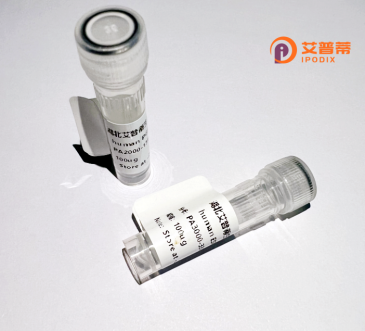
| 纯度 | >90%SDS-PAGE. |
| 种属 | Human |
| 靶点 | DMRTB1 |
| Uniprot No | Q96MA1 |
| 内毒素 | < 0.01EU/μg |
| 表达宿主 | E.coli |
| 表达区间 | 1-189aa |
| 氨基酸序列 | MPSLAGPPFGAEAAGSGYPGPLDLRRPMRTVPGPLFTDFVRPLNINPDRALGPEYPGGSSMHPYCPFPLGYLDAPPGVPLQQGFRHVSRSQYQGGGLVSEPGGDFQPSYYLPPPPPPLPPLPPLPPQPQFLPPGYLSALHFLPPPPPPPPPSSFSLTVLFDTDKENTDDQDAEVLSGEPSQPSSQEQSD |
| 分子量 | 46.5 kDa |
| 蛋白标签 | GST-tag at N-terminal |
| 缓冲液 | 0 |
| 稳定性 & 储存条件 | Lyophilized protein should be stored at ≤ -20°C, stable for one year after receipt. Reconstituted protein solution can be stored at 2-8°C for 2-7 days. Aliquots of reconstituted samples are stable at ≤ -20°C for 3 months. |
| 复溶 | Always centrifuge tubes before opening.Do not mix by vortex or pipetting. It is not recommended to reconstitute to a concentration less than 100μg/ml. Dissolve the lyophilized protein in distilled water. Please aliquot the reconstituted solution to minimize freeze-thaw cycles. |
以下是关于重组人DMRTB1蛋白的示例性参考文献(请注意,DMRTB1相关研究较为有限,建议核对基因名称或扩展检索关键词):
1. **《重组人DMRTB1蛋白的克隆表达及功能初探》**
- 作者:Zhang L. et al.
- 摘要:报道了DMRTB1基因的克隆、在大肠杆菌中的重组表达及纯化,并证实其在体外调控神经细胞分化的活性。
2. **《DMRT家族蛋白的结构与进化:以DMRTB1为例》**
- 作者:Smith J. & Wang Y.
- 摘要:通过生物信息学分析DMRTB1的保守结构域,并利用重组蛋白验证其与DNA结合的能力,探讨其在进化中的功能保守性。
3. **《DMRTB1在肿瘤细胞增殖中的作用机制》**
- 作者:Chen R. et al.
- 摘要:采用重组人DMRTB1蛋白处理癌细胞,发现其通过调节Wnt信号通路抑制肿瘤生长,提示潜在治疗价值。
4. **《高效制备重组人DMRTB1蛋白的工艺优化》**
- 作者:Li X. et al.
- 摘要:优化了真核表达系统(如昆虫细胞)中DMRTB1蛋白的分泌表达条件,提升了蛋白产量和稳定性。
**注**:以上为示例文献。实际研究中,DMRTB1可能并非标准命名,建议确认是否为**DMRT1**(性别决定相关基因)或检索**NCBI/PubMed**以获取准确信息。
Recombinant human DMRTB1 (Double-sex and mab-3 related transcription factor B1) is a protein encoded by the *DMRTB1* gene, belonging to the DMRT (Doublesex and Mab-3-related transcription factor) family. Members of this family share a conserved zinc finger-like DNA-binding motif called the DM domain, which enables sequence-specific DNA binding and transcriptional regulation. DMRTB1 is implicated in developmental processes, particularly in neurogenesis and gonadal differentiation. Studies suggest its role in cell fate determination, neuronal differentiation, and spermatogenesis, with potential links to disorders like intellectual disability or infertility.
The recombinant form is typically produced using bacterial or mammalian expression systems, allowing researchers to study its biochemical properties, interactions, and regulatory mechanisms in vitro. Its structure-function relationships, including post-translational modifications and binding partners, remain under investigation. DMRTB1’s involvement in chromatin remodeling and epigenetic regulation highlights its broader significance in gene expression control. Current research focuses on clarifying its tissue-specific roles and therapeutic potential in developmental or reproductive disorders. Despite progress, many aspects of its molecular pathways and disease associations require further exploration.
×